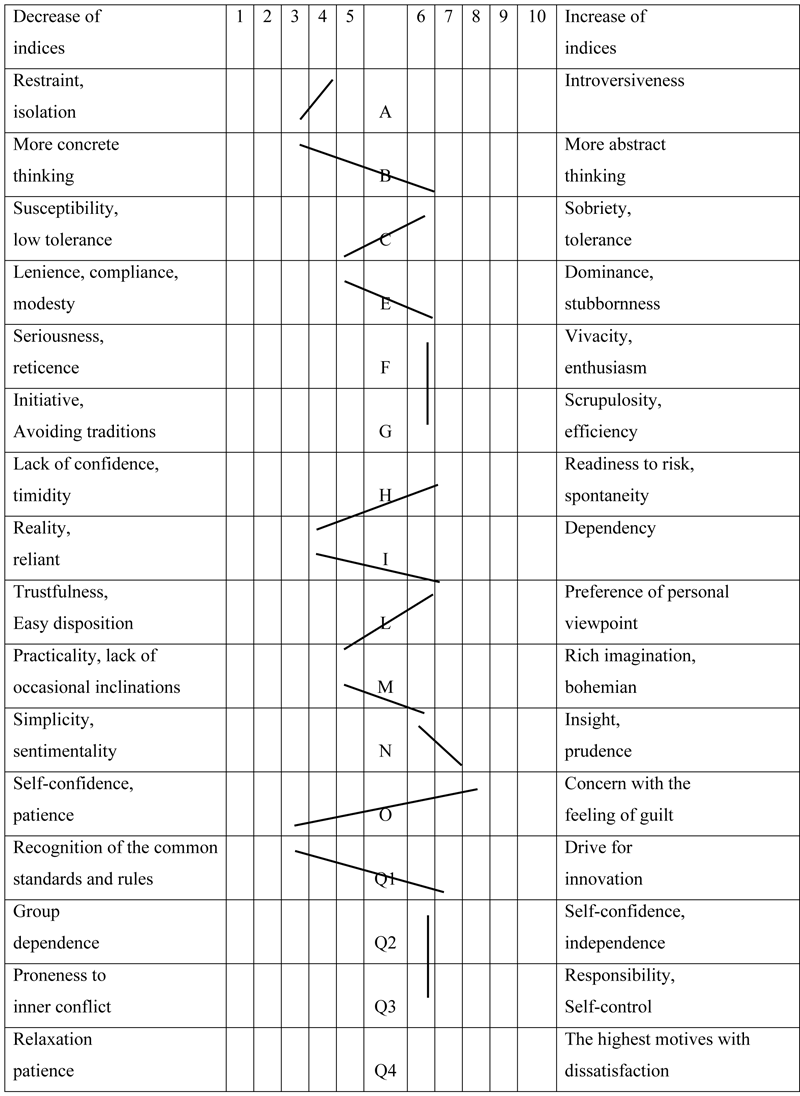Personality preconditions of emphatic behavior of future sports teachers
Фотографии:
ˑ:
Introduction. In the modern conditions of social development, where the state and society define for university experts the goal to create an educational environment as a condition of harmonious personality development, being revealed via the categories such as "social welfare", "safety and security”, "personality development" and "social adaptation", the problem of formation of the empathic culture of future experts of teacher’s professions gains special importance [3, 4].
The present level of professionalism of trainers and physical education teachers does not always fully meet the requirements of the modern times. This is due to the fact that colleges of education train future trainers and physical education teachers in accordance with the patterns and schemes based on the principles of specific knowledge transmission, when a pupil acts as an object of educational exposures, but not as a rightful participant of the educational process. Such a training of sports experts does not provide high efficiency of educational activity, its humanistic orientation [6].
Such a professionally important personality quality as empathy contributes to the implementation of the humanistic principles of teaching activity. Empathy helps a physical education teacher to see the real reasons of students’ particular behavior and creates the special emotional background that ensures full-value self-actualization of a student and a teacher. Empathy becomes a quality of teacher's personality only when all the constituents form an integral system [1, 2, 5, 7].
Naturally, teacher can not empathize with all students and in all cases. Physical education teacher can sympathize with a student, who has failed a standard credit, but he does not need to put himself in his place and feel similar emotions. Meanwhile, teacher can better understand this pupil’s aspirations, attitude to the subject taking into account his feelings.
A teacher of physical education and a pupil should be ready and able to consider other viewpoint to understand each other. Teacher is to be the first to take such a position, as, for instance, primary schoolchildren cannot understand and accept the educative targets of their physical education teacher due to the small life experience and limited intellectual development. Pupils want to have fun, run at the lesson of physical culture, while teacher should settle a number of educational tasks, claiming from pupils an order in a class and observing the discipline.
Schoolchildren's behavior is more under the command of actual interests while a physical education teacher is guided by long-term interests and goals. However, teacher is to understand and take into account children's wishes and aspirations, be able to get and take their viewpoint, i.e. demonstrate empathy, so that the long-term curriculum was realized every day.
I.M. Yusupov [8] marks that empathy is determined by the individual-typological characteristics of students of higher institutions of physical culture and sport.
Materials and methods. 110 students of Velikie Luki state academy of physical culture and sport from different specializations, including: theory and methodology of physical education, theory and methodology of sports games, theory and methodology of skiing, theory and methodology of gymnastics, theory and methodology of track and field, were the subjects of the experiment.
We have cleared that the basic empathic level of students of all specializations is low - 19 ± 1,8 to 21,5 ± 2,8 points. Consequently, the respondents have difficulties with establishing contacts with people. Emotional expressions in the actions of people around sometimes seem to them obscure and devoid of sense. They are the supporters of exact definitions and rational decisions. They value people most of all for business qualities and clear mind rather than responsiveness and sympathy.
In the study of individual-typological characteristics using the Kruskal-Wallis Н-criterion we have determined non-significant differences in the display of personality characteristics in the subjects of various sports specializations. So, specialization is not essential for the display of personality characteristics of students of higher educational institutions of physical culture.
Results of the study. Based on the findings we have made the personality profile of future physical education and sports teachers (Fig.).

Fig. The display of personality characteristics in future trainers and physical education teachers
Students of all the studied specializations tend to understand the material slowly, prefer specific, literal information (the results in the B factor range from 2,73 to 3,25 points), are convinced in the correctness of their knowledge (the Q1 factor totaled from 6,36 to 6,75 points). Students tend to interfere and withstand changes, keep to traditions (the M factor indices range from 5,5 to 5,75 points).
The study of the emotional-volitional sphere of the respondents’ personalities reveals their emotional lability, they are easy to upset (the results in the C factor ranged from 8 to 8,38 points), have an increased anxiety level (the О factor totaled from 6,36 to 7,25 points). But most of the respondents are persistent, obliging and reliable (indices of the G factor range from 7,56 to 8,75 points).
In serious matters they rely only upon themselves, as they cannot stand monkey business (the I factor ranged from 4,88 to 5,88 points) and push through, purposive (the results in the Q3 factor range from 6,67 to 7,42 points). Proceeding from the results in the Q4 factor, most of the respondents tend to stress, excitation and concern (from 4,73 to 5,88 points).
The analysis of the personality communicative sphere have revealed that most of the students are restraint, isolated (the results in the A factor range from 6,63 to 7,27 points), compliant, flexible (the indices of the E factor range from 4,5 to 5,37 points), reactive to threat in social situations (the Н factor totaled from 7 to 7,7 points). They have a mind of their own and are not easy to cheat (the results in the L factor amounted from 4,46 to 5,38 points), perspicacious (N factor from 5,75 to 6,25 points). The respondents value social approval (the results in the Q2 factor range from 4,91 to 5,42 points), social contacts are emotionally important for them (the results in the F factor range from 5,5 to 6,12 points).
The personality characteristics stipulating for empathic behavior were detected via the correlation analysis using the Pearson criterion, which revealed the relationship of empathy and such personality qualities as sociability (А factor, r=0,22), expressivity (F factor, r=0,24), social boldness (Н factor), self-confidence (О factor, r=0,21), humane-oriented radicalism (Q1 factor, r=0,22), adequate conformity (Q2 factor, r=0,23) and tension (Q4 factor, r=0,23) at р ≤ 0,05. But the observed problems in the emotional and communicative spheres impede empathy display.
Conclusion. Hence, a set of psychological and acmeological training sessions intended to develop personal qualities, facilitating empathy manifestation in the work of future sports experts, not substituting it to pseudoempathy, is to be introduced into the teaching process. The occurring changes will create absolutely new internal potentials for personality’s professional development and consequently the capacity of qualitative changes in their behavior, as well as facilitate personality development and self-actualization of both pupils and teachers.
References
- Afanas'eva, N.V. Formation of readiness of future primary teachers for empathic cooperation with students / N.V. Afanas'eva: Ph.D. thesis. – Kazan, 2001. – 189 P. (In Russian)
- Akhryamkina, T.A. Formation of students' empathy within studies in a teacher's college / T.A. Akhryamkina: Ph.D. thesis. – Samara, 2003. – 178 P. (In Russian)
- Brazhnikova, A.N. Empathy as one of the constituents of future expert's morals / A.N. Brazhnikova, A.A. Zyuzya // Uchenye zapiski universiteta imeni P.F. Lesgafta. – St.Petersburg, 2011. – № 6(76). – P. 12–16. (In Russian))
- Buravtsova, N.V. The influence of sovereignty of personal boundaries on the manifestation of empathy in future teachers and psychologists / N.V. Buravtsova // Psikhologiya v vuze. – 2008. – № 1. – P. 47–57. (In Russian)
- Vedeneeva, L.V. Formation of empathy in future teachers within humanization of the training process / L.V. Vedeneeva: Ph.D. thesis. – Volgograd, 2001. – 194 P. (In Russian)
- Gumerova, Ya.Yu. The effect of the consciousness and empathy levels of the ideas of freshmen of ChelSMA and UralSUPC on the doctor's and trainer's "profile" / Ya.Yu. Gumerova // Optimization of the training process in the educational institutions of physical culture: Proceedings of the XX regional theor.-pract. conf. (May, 21 2010). – Chelyabinsk, 2010. – P. 75–77. (In Russian)
- Mozgovaya, N.A. Formation of empathic statement in teacher's training / N.A. Mozgovaya // Teacher's professional creativity: Proceedings. – Shadrinsk: Shadr. Iset', 1997. – P.40–50. (In Russian)
- Yusupov, I.M. Empathy. Touch. Comprehension / I.M. Yusupov. – Kazan: Kazan un-ty, 1993. – 202 P. (In Russian)
Author’s contacts: prorector_nir@vlgafc.ru



 Журнал "THEORY AND PRACTICE
Журнал "THEORY AND PRACTICE